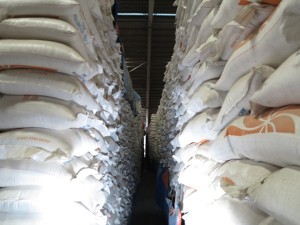PH presses bid to keep rice import controls
The Philippines has renewed its appeal to the World Trade Organization (WTO) to allow Manila to keep its restrictions on rice imports.
During the Council for Trade in Goods meeting in Geneva, Switzerland, last April 9, “the Philippines reiterated its request for a waiver relating to special treatment for rice,” the WTO said on its website, referring to the quantitative restriction (QR) being slapped by Manila on the commodity.
According to the WTO, the Philippines “again emphasized that this request is in the context of its food security needs.”
In 1995, the WTO allowed the Philippines to impose a 10-year quota system for rice importation. The QR was extended in 2004 and then lapsed in 2012. The Philippines has been requesting the WTO to further extend the QR on rice up to 2017.
During the meeting, the Philippine WTO mission cited that “it had been working on this matter for the past two years with other members, not only in Geneva but also in Manila and other capitals.”
Article continues after this advertisementSo far, China, India, Indonesia and Vietnam have expressed support for the Philippines’ request and have urged other WTO members that might be affected by a QR extension to conclude consultations with Manila, according to the WTO.
Article continues after this advertisementAs for Australia, Canada, Thailand and the United States, their consultations with the Philippines were still ongoing, the WTO noted.
In a letter to Agriculture Secretary Proceso J. Alcala last December, Justice Secretary Leila M. Lima thumbed down the Department of Agriculture’s (DA) position of extending the QR, citing that “among the considerations are the possible legal repercussions of the Philippines being perceived to be in breach of its WTO commitments.”
The DA and the National Food Authority (NFA), however, had both insisted that they could still implement the QR while WTO negotiations for its extension were ongoing.
Agriculture Assistant Secretary Romeo S. Recide in March expressed confidence that trading partners would support the Philippines’ bid for an extended QR. “We are very positive that we will acquire consensus with interested countries. This will allow us to operate under a new quantitative restriction extension,” he had said.
The QR is being seen as a measure that would buy time for local farmers to prepare for free trade under the WTO in light of the government’s goal of achieving self-sufficiency in rice production by end-2015.
